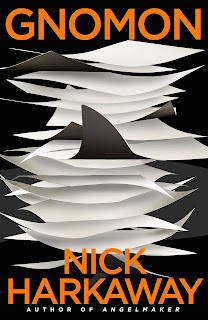Gnomon - Nick Harkaway
In the case of Gnomon, the obvious comparisons are works by David Mitchell, Christopher Nolan and – almost inevitably these days when you are dealing with high concept science-fiction – Philip K Dick. Gnomon is made up of a number of interconnected stories, exotic in nature, covering cast distances of space and time in the manner of Mitchell’s Ghostwritten or Cloud Atlas – and there’s a little bit of the computer game world and Orpheus mythology of Mitchell’s opera with Michel van der Aa, Sunken Garden. There’s an element of Christopher Nolan’s Inception in that those identities are overlaid, imported into the mind and ‘lived’ in a mental dream-state, adopting a persona from a scanned memory, and the line between the dream and the reality becomes more and more uncertain the deeper the dream goes.
Initially, at least, we are in a kind of Philip K Dick Minority Report-like UK, where the state governs and controls the population through the System and the Witness, having direct access to the minds of its citizens, and the ability thereby to intervene and correct flaws in health and personality, all of course in the best interests of its citizens to protect them from crime and danger. It’s a perfection of justice and democracy and just as creepy as that concept suggests. A few people however resist such intrusion into their minds and freedoms, and one of them is Diana Hunter, an author celebrated for her notorious ‘ghost novels’ that are deeply subversive and have an occult-like power, but don’t really seem to exist.
Witness officer Mielikki Neith gets more than she bargained for when she investigates the probe and memory upload that has eventually been forced upon Diana Hunter which has resulted in her death. Aside from the unusual structure of Hunter’s mind, Neith is subsequently assailed by the narratives of several other individuals and lives out their recollection of their lives. Among them is a Greek banker Constantine Kyriakos who after surviving a shark attack finds himself able him to predict major movements in the financial markets; Athenais Karthagonensis, an alchemist in 4th century Carthage who has forged a Scroll known as the Quaerendo Invenietis, only to see her work made real; and Berihun Bekele, a visionary Ethiopian artist who helps design an intrusive video game that organically and intuitively extends itself to create an ideal new structure for the world to replace the one that is about to collapse.
If it were channelling Mitchell, Gnomon would be a testament to the power of stories, to the power of imagination to create, shape and transform the world, or in Nolan it would be a complex puzzle that hints at an underlying force connecting everything together; or in PKD it would be a paranoid philosophical investigation of human neutral pathways interacting with technology, blurring the lines of what makes us human and opening the way to a warning against a surveillance society. Nick Harkaway’s novel not only ambitiously combines all those ideas into a (mostly) coherent whole that comes together impressively at the end, but he also manages to view it in the context of our own society today, specifically in relation to the ugly side of the UK that has been shown by Conservative policies, nationalism and Brexit.
Gnomon is a little bit of everything. It’s science-fiction, a murder mystery investigation and a warning about how society is not just growing tolerant of fascism, but is showing an increasing propensity towards accepting it. The novel is also a post-modern self-reflexive questioning on the function of writing and its ability to stimulate the mind, expand beyond words on the page, on its escapist nature to insulate against the horrors of world while at the same time inform and speak out against them. As Berihun Bekele observes at one point “What possible virtue is there in painting, and most especially in painting inner vistas of futurity and madness, when madness is the common currency of everyone around?”
Swap ‘painting’ for ‘writing’ and you find some clue to the intentions of Gnomon as a very real and pertinent response to the function of not just a writer, but the individual in the face of an increasingly intolerant and right-wing society that we can recognise around us today and how we all have a duty to not only recognise it, but resist it. Gnomon is not just a clever puzzle to be worked out, although it is very clever and does have a plot that folds-in on itself. Running to 700 pages, it’s a little bit sprawling, a little bit over-written in places, undoubtedly overreaching and over-ambitious to the point of near incomprehensibility in places, but it all does seem to come together and make sense, even if it’s only to tell us that the world doesn’t make sense any longer and we all need to do something about it.
Gnomon by Nick Harkaway is published by William Heinemann.




Comments
Post a Comment